King Mithradates VI Of Pontus Used Poison To Avoid Death By Poison
Ellen Lloyd - AncientPages.com - Mithradates VI Of Pontus (120-63 BCE), often referred to as the Poison King, was a brilliant toxicologist. He was obsessed with poison and took small doses of a specially prepared poison to help him develop resistance if some should try to poison him.
 Mithridates - the toxicologist found art of preventing and counteracting poisioning.(4) Galen was the foremost person who practiced and thought the principles of preparing and dispensing medicines. Galenicals-class of pharmaceuticals was named after him. Image credits: American Pharmacists Association
Mithridates - the toxicologist found art of preventing and counteracting poisioning.(4) Galen was the foremost person who practiced and thought the principles of preparing and dispensing medicines. Galenicals-class of pharmaceuticals was named after him. Image credits: American Pharmacists Association
He was impressed by eating poison, murdered his mother to become king, and was Rome's worst enemy. King Mithridates hated the Roman Empire and sent their army west to crush the "Romans, the enemy of all humanity."
Living in times when slipping poison into food or drink was a reality that had been one of the choice methods of assassination for thousands of years, King Mithradates VI began a rigorous program to educate himself on every form of poison. That knowledge would later become his greatest enemy.
King Mithradates VI Of Pontus descended from Alexander the Great and Darius of Persia. He was a powerful king who challenged the late Republican Rome, creating an empire that stretched from the northern reaches of the Black Sea to Syria and Armenia. While loathed by Rome for his massacre of 80,000 Roman civilians in 88 BCE, Mithradates was hailed by Greeks and Persians as a "savior" from oppressive Roman misrule. Rome's Rome's most relentless rival became feared as "the Hannibal of the East."
In time, Mithridates would take the title "the Great" or Megas and be known as Eupator Dionysius. The title, "Eupator," means "born of a noble father," and his connection to the god of wine and revelry, Dionysius (Bacchus-Roman), is evident.
Mithridates VI from the Musée du Louvre.
King Mithradates VI had an excellent reason to become obsessed with poison. The previous ruler and king, Mithridates V, had been assassinated by poison at a banquet in 120 BC in the city of Sinope, the same place where Mithridates VI was born.
Now, of course, King Mithridates VI, who had plenty of enemies, feared he might one day succumb to a similar fate.
King Mithradates VI started to mix different herbs to learn the secrets of poisons. He studied everything he could get his hands on and consulted some of his most trusted advisers. His desire to avoid death by poison became a severe fear of his in an attempt to make sure he was immune to every type and consistency of poison. He developed lethal poisons and then took small, self-administered, non-lethal doses to ensure his immune system could survive.
In our present day, this practice has become known as, Mithridatism which is a system practiced in parts of the world and in unique fields, such as snake handlers or people who work with poisons of a unique nature.
Mithradates' wars against Rome lasted four decades, engulfing three continents.
In the end, Rome was victorious, and King Mithradates VI lost his kingdom and life. Still, he pushed the Roman Republic, already reeling from slave revolts and domestic violence, over the brink of self-destruction and forced reinvention.
Machiavelli praised his military genius. European royalty sought out his secret elixir against poison. His life inspired Mozart's first opera, poets and playwrights recited bloody, romantic tales of his victories, defeats, intrigues, concubines, and mysterious death for centuries. But until now, no modern historian has recounted the full story of Mithradates, the ruthless king and visionary rebel who challenged the power of Rome in the first century BC.
The Poison King describes a life brimming with spectacle and excitement. Claiming Alexander the Great and Darius of Persia as ancestors, Mithradates inherited a wealthy Black Sea kingdom at age fourteen after his mother poisoned his father. He fled into exile... Read more
When King Mithradates VI saw that everything he had fought for was lost, he would shamefully withdraw to the citadel in Panticapaeum surrounded by his enemies who sought to overthrow him. With no way out and the great king and enemy of Rome sensing his end, he decided on his terms to take the noble way out - suicide. His years of strengthening his immune system against the use of poison would prove to be the greatest enemy in his final moments as the sad and furious king attempted to take his life by poison but found it was to no avail.
Thus, ordering a mercenary to run him through with his sword, Mithridates committed suicide and ended the great Pontic Kingdom and its ruler, who hated Rome.
Today, not many people are familiar with the history of Mithradates VI Of Pontus, who challenged Roman imperialism more than 2,000 years ago.
However, in antiquity and the Middle Ages, and even into the 20th century CE, Mithradates was as famous as Hannibal (247-183/182 BCE), Spartacus (c. 109-71 BCE), Cleopatra VII of Egypt (r. 51-30 BCE), and other illustrious enemies of the Roman Republic. His life inspired Machiavelli (1469-1527 CE) and Racine (1639-1699 CE), and one of Mozart's first operas: Mitridate, re di Ponto (1770).
Written by - Ellen Lloyd – AncientPages.com
Updated on February 11, 2023
Copyright © AncientPages.com All rights reserved. This material may not be published, broadcast, rewritten or redistributed in whole or part without the express written permission of AncientPages.com
Expand for referencesReferences:
Matyszak P. Mithridates the Great: Rome’s indomitable enemy
Peter J. Fast - Mithridates VI of Pontus: The Poison King Who Hated Rome
Mayor A. : The Poison King
More From Ancient Pages
-
 Brief History Of Abortion – From Ancient Egyptian Herbs To Fighting Stigma Today
Featured Stories | Oct 3, 2023
Brief History Of Abortion – From Ancient Egyptian Herbs To Fighting Stigma Today
Featured Stories | Oct 3, 2023 -
 Huge, Ancient Underground City Filled With Artifacts Discovered In Mardin, Turkey
Archaeology | Apr 20, 2022
Huge, Ancient Underground City Filled With Artifacts Discovered In Mardin, Turkey
Archaeology | Apr 20, 2022 -
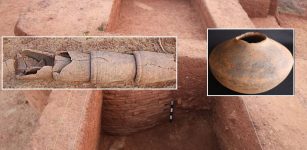 2,000-Year-Old Trade Center: Brick Structure, A Vishnu Sculpture Among Findings In Andhra Pradesh
Archaeology | Nov 6, 2019
2,000-Year-Old Trade Center: Brick Structure, A Vishnu Sculpture Among Findings In Andhra Pradesh
Archaeology | Nov 6, 2019 -
 The Black Pyramid Of Amenemhat III – Mysterious Underground Chambers And Lost Ancient Treasures
Featured Stories | Aug 9, 2021
The Black Pyramid Of Amenemhat III – Mysterious Underground Chambers And Lost Ancient Treasures
Featured Stories | Aug 9, 2021 -
 Why Did Ancient Romans Destroy The Town Of Fregellae?
Archaeology | Oct 14, 2024
Why Did Ancient Romans Destroy The Town Of Fregellae?
Archaeology | Oct 14, 2024 -
 Mysterious Ancient Maya ‘Star War’ Glyph And Its Possible Connection To Venus
Archaeoastronomy | Feb 20, 2019
Mysterious Ancient Maya ‘Star War’ Glyph And Its Possible Connection To Venus
Archaeoastronomy | Feb 20, 2019 -
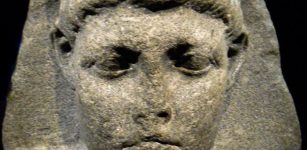 ‘Little Caesar’: Forgotten ‘King Of Kings’ Who Died Very Young
Featured Stories | May 11, 2020
‘Little Caesar’: Forgotten ‘King Of Kings’ Who Died Very Young
Featured Stories | May 11, 2020 -
 On This Day In History: Naval Battle Of Rennell Island Fought Off Guadalcanal – On Jan 29, 1943
News | Jan 29, 2017
On This Day In History: Naval Battle Of Rennell Island Fought Off Guadalcanal – On Jan 29, 1943
News | Jan 29, 2017 -
 On This Day In History: Battle of Castillon Ended ‘Hundred Years’ War – On July 17, 1453
News | Jul 17, 2016
On This Day In History: Battle of Castillon Ended ‘Hundred Years’ War – On July 17, 1453
News | Jul 17, 2016 -
 Great Flood Myth Told By Klallam People Of Washington’s Olympic Peninsula – Confirmed
Archaeology | May 17, 2019
Great Flood Myth Told By Klallam People Of Washington’s Olympic Peninsula – Confirmed
Archaeology | May 17, 2019 -
 Lost Q Source Remains An Unsolved Biblical Mystery
Biblical Mysteries | May 7, 2017
Lost Q Source Remains An Unsolved Biblical Mystery
Biblical Mysteries | May 7, 2017 -
 First European Farmers’ Heights Did Not Meet Expectations
Archaeology | Apr 8, 2022
First European Farmers’ Heights Did Not Meet Expectations
Archaeology | Apr 8, 2022 -
 Biblical Events Confirmed: The Jerusalem’s Wall That Nehemiah Built
Biblical Mysteries | Mar 19, 2014
Biblical Events Confirmed: The Jerusalem’s Wall That Nehemiah Built
Biblical Mysteries | Mar 19, 2014 -
 Why Winter Solstice Matters Around The World
Archaeoastronomy | Dec 20, 2022
Why Winter Solstice Matters Around The World
Archaeoastronomy | Dec 20, 2022 -
 DNA Evidence For Early Contact Between Farmers And Pastoralists In Black Sea Region
Archaeology | Jul 20, 2023
DNA Evidence For Early Contact Between Farmers And Pastoralists In Black Sea Region
Archaeology | Jul 20, 2023 -
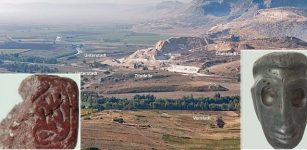 Bronze Age And Iron Age City Complex Once Known As Kummanni Unearthed In Turkey
Archaeology | Dec 4, 2018
Bronze Age And Iron Age City Complex Once Known As Kummanni Unearthed In Turkey
Archaeology | Dec 4, 2018 -
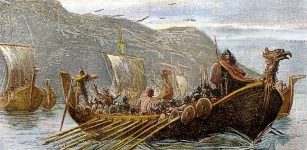 Norse Kingdom Of Dublin Was Founded By The Vikings In 839 A.D.
Ancient History Facts | Mar 15, 2016
Norse Kingdom Of Dublin Was Founded By The Vikings In 839 A.D.
Ancient History Facts | Mar 15, 2016 -
 Why Is Africa Called Africa?
Ancient History Facts | Dec 1, 2020
Why Is Africa Called Africa?
Ancient History Facts | Dec 1, 2020 -
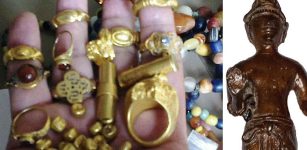 Legendary Lost Island Of Gold Of The Mysteriously Vanished Srivijaya Civilization Found Underwater
Archaeology | Oct 25, 2021
Legendary Lost Island Of Gold Of The Mysteriously Vanished Srivijaya Civilization Found Underwater
Archaeology | Oct 25, 2021 -
 Alkonost – Mythical Bird Of Paradise In Slavic And Russian Folklore
Featured Stories | Jul 6, 2020
Alkonost – Mythical Bird Of Paradise In Slavic And Russian Folklore
Featured Stories | Jul 6, 2020


